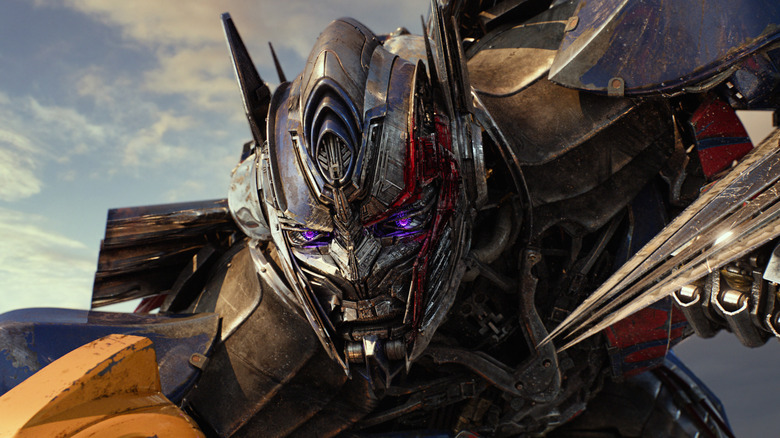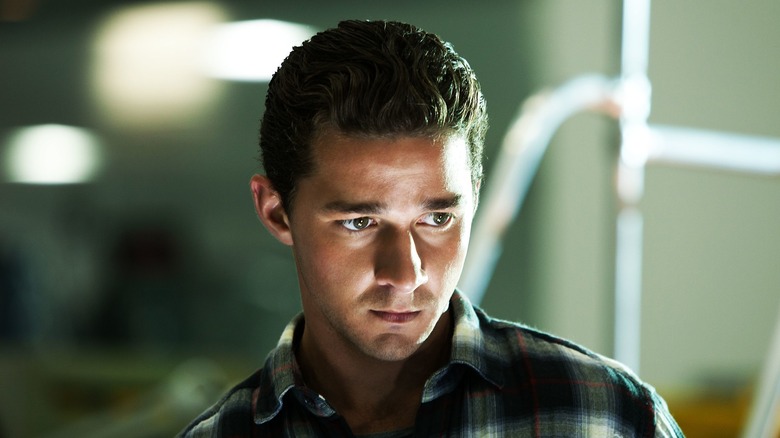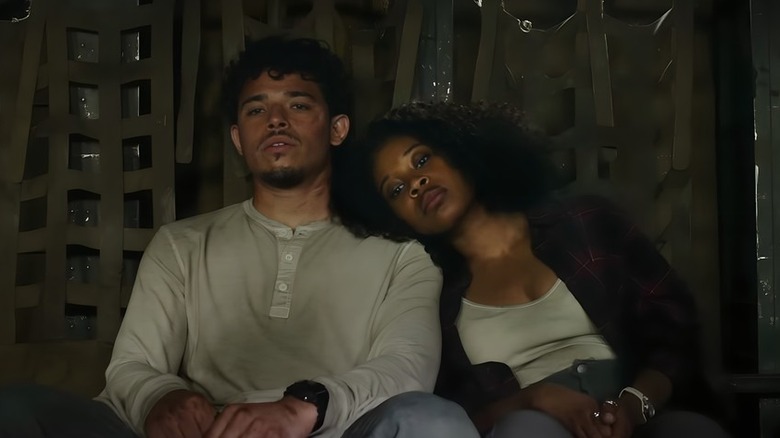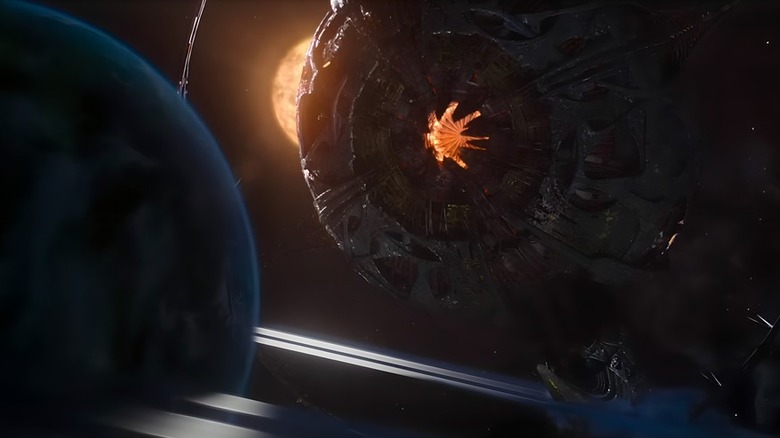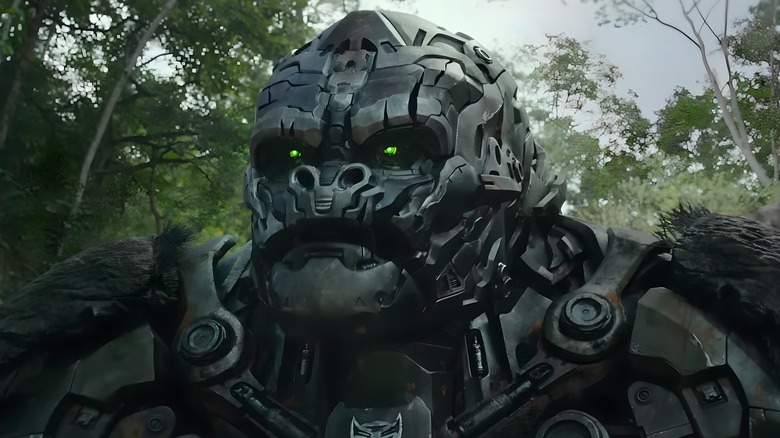Every Transformers Movie Has The Exact Same Problem
For better or worse, the "Transformers" movies have been a Hollywood staple for a decade and a half. Michael Bay's 2007 film predates the start of the Marvel Cinematic Universe, the beginning of Disney's "Star Wars" reign, and even "The Dark Knight," making the series one of the longest-running blockbuster franchises of the modern era. And yet, taken in total, it's still not very good, is it?
Sure, you'll find defenders of the original movie and some champions of the 2018 "Bumblebee" spin-off. And hey, there are some genuinely fun and sweet moments in "Transformers: Rise of the Beasts." But for the better part of 15 years, "Transformers" has been synonymous with Hollywood mediocrity. Be it the cringeworthy (and frequently racist) humor of Bay's films or the over-lush CGI effects, most everybody has a bone to pick with some aspect of the franchise.
Again, there have been high points. And if you have some fun watching the "Transformers" movies, then more power to you. But even the best entries in the series are plagued by a fundamental misunderstanding of the source material: a belief that these movies are about the human characters at their core, not the giant robots everyone actually came to see.
Bay may no longer be sitting in the director's chair, but even in "Rise of the Beasts," his punch-drunk fingerprints can be felt. Every "Transformers" movie has the exact same problem. They think they're regular action-adventure movies with a giant robot paint job, rather than the zany sci-fi epics they should have been from the start.
How Michael Bay burned Transformers forever
The Hollywood blockbuster was a very different beast back in 2007. Comic book movies existed, but they weren't the industry titans they are today. There was a certain kind of PG-13 movie that ruled the box office, and Michael Bay was its patron saint.
Sure, you could argue that "Transformers" didn't provide a lot of material to start with. It's a franchise that only ever existed to sell toys. But within the capitalist exoskeleton that surrounds the brand, there are glimmers of fun: the grandiose sci-fi setting, the focus on ancient lore, and the classic brother vs. brother narrative of Optimus Prime and Megatron's relationship. Slim? Sure, but it's something — something that made tons of kids fall in love with "Transformers" over the two decades before the first live-action movie.
But Bay and Paramount Pictures didn't want anything to do with that. "Transformers" isn't a fun sci-fi story that plays in the epic fantasy space. It's a regular old government conspiracy action movie with a lot of green screens. Blend that with an obnoxious brand of comedy that never, ever knows when to shut up, and you've got the blueprint that guided every "Transformers" movie for years. In essence, Bay created a whole new brand that had little in common tonally with the rest of the franchise. More often than not, his movies take on an almost antagonistic tone toward the source material — a kind of jock writing that makes fun of the very things fans love about "Transformers." The last two entries are much better on those last two fronts, but they still don't solve the core problem.
Transformers is convinced that we care more about the humans
Yes, the original "Transformers" cartoon takes place on Earth, as do many of its successors. They feature human characters pretty prominently. But those characters were never, ever the focus. They weren't shows about humans being exposed to a larger world and learning to live alongside the Cybertronians. They were about the war between the Autobots and the Decepticons. That's the part that people cared about and where the emphasis always was. After all, Hasbro wasn't trying to sell action figures of the humans.
In the live-action movies, however — even the more recent ones that embrace the "G1" aesthetic a bit more — the humans drive the car, so to speak. There's so much time spent in every single entry dealing with romantic relationships, human families, and the hopes and dreams of us mere sapiens that if you jump in at the wrong timestamp, you might not even realize what movie you're watching. Half of the runtime in Bay's films is dedicated to "Family Guy" jokes and guys trying to get girls' numbers. And while "Bumblebee" and "Rise of the Beasts" are better, they still pull the focus off of the Autobots way too much.
Ask any true fan of the franchise why they love it, and you'll get a range of answers. Maybe it's the unique but hyper-legible designs of the Cybertronian characters. Maybe it's the overriding message that doing the right thing is worth it, even when it's hard. Or maybe it's the generations-long feud between two titanic factions, destined to be locked in eternal combat until their sparks die out. Not one person would say they love "Transformers" for the jokes, or for that guy who finds Bumblebee.
The Transformers movies live in the wrong genre
Think about what the "Transformers" movies might have been like if they had begun in 2015, rather than 2007. "Guardians of the Galaxy" was out by then. So was "Dawn of the Planet of the Apes." A much larger percentage of moviegoers were open to both wacky cosmic sci-fi stories and CGI characters taking the lead. We live in an era when time travel and the multiverse are key ingredients to the biggest movies on the market. "Transformers" should thrive today, but the film series is still hindered by its past.
Maybe the problem is that the brand hasn't been terribly relevant outside of the movies in many years. The days when cartoons dominated pop culture are over, and the toy market certainly isn't what it used to be in the modern digital age. There have been moments of relevance — a few well-liked video games and animated series — but for the most part, "Transformers" is the movie franchise at this point. People have come to expect them to fall somewhere between "National Treasure" and "Independence Day," and that's a shame.
The problem is that these movies exist in the wrong genre. They shouldn't be fish-out-of-water stories with secret government agencies and human hackers taking center stage. What they should be — and still can be — are wacky, sincere sci-fi epics that embrace all of the dorkiness and deep lore of the cartoons.
The right way to make a Transformers movie
How do you make a great "Transformers" movie that eschews these human-centric problems? To be fair, the last couple of films have taken steps in the right direction. "Bumblebee" finally gave us some actual scenes on Cybertron and "Transformers: Rise of the Beasts" brings in a lot of fun lore via Unicron, the Terrorcons, and the Maximals. But that's still not enough. Suspend your disbelief for a moment — that reluctance to buy into a franchise based on children's toys — and think about what "Transformers" could be.
At its core, "Transformers" is a tragic story. It's the tale of a species that destroyed its own home through an unwillingness to do the hard work and make peace. Every Autobot and Decepticon is an outcast, a tragic figure whose cultural history weighs on their metal shoulders. And there are so many more places to take that story than boring old Earth.
The problem, of course, is that it's much easier to set live-action movies on Earth. But why stay restricted to live-action? We live in a world where "Spider-Man: Across the Spider-Verse" just received more universal acclaim than any genre blockbuster has all year. Why not branch out?
The "Transformers" movies should embrace their animated predecessors, thus allowing for both more creativity and broader storytelling options beyond the bounds of Earth. Or if Paramount really insists on staying in the live-action realm going forward, please, at least follow the "Guardians of the Galaxy" model and embrace the colorful fun of the series' science fiction potential.
